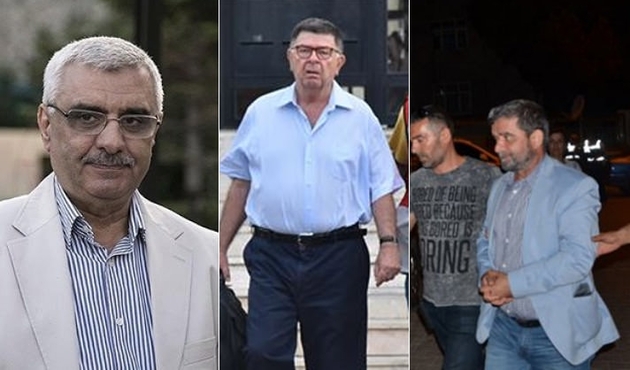In Major Media Trial, Turkish Court Releases Only Three Journalists
Turkey has dozens of trials against scores of journalists in different cities. With so many cases looming ahead, only a fraction of those trials now commands national or international attention.
On Friday, a Turkish court ruled to release three employees of the now-defunct Zaman daily while decided to keep most of the journalists in the pre-trial detention in a case against editors and columnists of Zaman. The story largely went unnoticed from the public radar.
Ali Bulac, Mumtaz’er Turkone, Mustafa Unal and other columnists face three aggravated life sentences for their columns in Zaman daily.
They are accused of “attempting to dismantle constitutional order, toppling the government by abetting coup plotters and forming an armed terrorist organization,” charges that are simply regarded by media watchdog groups and human rights organizations as absurd and detached from reality.
Onur Kutlu, Ismail Kucuk and Huseyin Belli who were working for the Advertisement Department of the newspaper were released by the court. Out of 31 defendants, 22 of them were kept in pre-trial detention while the rest were already released pending trial.
Calloused by thousands of ongoing trials in the aftermath of a failed coup, Turkish public seems to be unperturbed in the face of media cases. Only rights groups and family members of the defendants were present at an Istanbul court.
Emre Soncan, former defense and presidential reporter of Zaman, put a brave defense, dismissed charges as politically motivated. He said he is being tried for doing journalism, and evinced no regret for what he wrote or reported.
This Trial Is Political Revenge
Veteran novelist and columnist Ahmet Turan Alkan underlined that it was a political trial, and they are victims of political revenge of the government.
“Five hundred days forcefully stolen from someone’s life can never be overlooked,” Mr. Alkan said, addressing the packed courtroom in Istanbul Courthouse.
“You are much better aware than me, everyone is aware of the fact that this probe was not launched because of a crime defined in the law.
“This trial is a consequence of vindictive vengeance and political revenge. We are testifying as defendants against this vengeance and revenge,” the writer said in lamentation.
“Is it so easy to steal 500 days from the life of an ordinary man with such petty charges that could not be taken seriously? he asked in disbelief.
Answering his own question, the writer noted that in the Republic of Turkey, a country governed by “rule of law”, yes, it was so easy.
For writing in the Zaman daily, Mr. Alkan appeared to be unrepentant, even proud, in the face of what he says the government’s politically motivated accusations.
“I wrote what I believed. I do not have any personal affiliation with Erdogan nor Gulen. I’m proud of that,” he added.
The case illuminates the harrowing state of Turkey’s media. And the lack of public interest in media trials reveals how people get used to the new reality under the state of emergency, which will be in place for an indefinite period, according to the Turkish government.
It is much more difficult, as Mr. Alkan noted, to be tried in a case related to Gulen movement and its media outlets.
“Maybe you do not know, we went through 500 days of heavy isolation. We are treated as traitors; this is an official policy,” he said of the prison conditions.
“They want me to do this: losing my sanity in prison. I feel resented by the state which waits for me to lose my mind.”
According to Mr. Alkan, the trial against Zaman journalists aims to intimidate other journalists. Because of the unjust “FETO” label, he argued, they are left alone by others as no one came to their defense and solidarity.
Other journalists in the court hearing made similar defenses. Mumtaz’er Turkone said whatever he wrote in his columns, none of them fit terrorism label described by Supreme Court. He said 10 of his columns which were cited in the prosecutor’s indictment against him could well be used against prosecutor’s charges in the legal point of view.




Comments are closed.